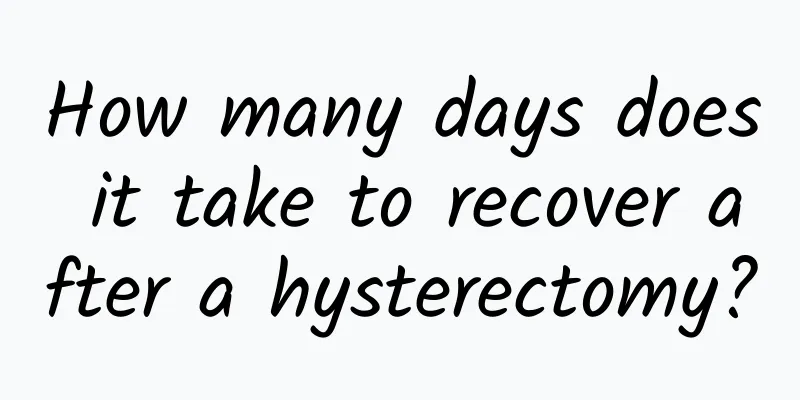How many days does it take to recover after a hysterectomy?

|
It usually takes 7-14 days to recover after a diaphragmatic incision. The recovery time varies depending on individual constitution, postoperative care and surgical method. After the operation, you should pay attention to rest, diet and wound care, and avoid infection and strenuous exercise. 1. Individual differences in postoperative recovery time are mainly related to the surgical method, patient age and health status. Patients with less surgical trauma and better physical fitness recover faster, possibly within a week; while patients with greater trauma or weaker physical fitness may need two weeks or even longer. Elderly people, patients with low immunity or combined chronic diseases recover more slowly and need more careful care. 2. Postoperative care is a key factor affecting recovery. Keep the wound clean and dry, avoid water or contamination. Apply cold compresses within 24 hours after surgery to reduce swelling, and apply hot compresses after 72 hours to promote blood circulation. Change the dressing on time and observe the wound healing. If redness, swelling, exudation or pain worsens, seek medical attention in time. Avoid strenuous exercise or heavy physical labor to prevent the wound from splitting or bleeding. 3. Dietary conditioning helps speed up recovery. After surgery, you should eat more foods rich in protein, vitamins and minerals, such as lean meat, fish, eggs, milk, fresh fruits and vegetables, etc. Protein helps tissue repair, vitamin C promotes collagen synthesis, and zinc and iron are beneficial to wound healing. Avoid spicy, greasy, and irritating foods to avoid affecting wound recovery. 4. Psychological adjustment cannot be ignored. After surgery, patients may experience anxiety, tension and other emotions, which may affect sleep and appetite, and thus delay recovery. Family members should give care and support, and patients can relax by listening to music, reading, etc. If emotional problems continue to worsen, you can seek help from a psychologist. 5. Regular follow-up is an important part of ensuring recovery. Regular follow-up should be performed according to the doctor's instructions after surgery. The doctor can adjust the treatment plan in time by checking the wound healing and assessing the degree of functional recovery. If any abnormality is found during the follow-up, early intervention can be made to avoid complications. The recovery time after diaphragmatic incision varies from person to person. Scientific care, proper diet, psychological adjustment and regular check-ups can accelerate the recovery process and reduce the risk of complications. After surgery, patients should strictly follow and pay attention to their own recovery. If they feel unwell, they should seek medical attention in time to ensure smooth recovery. |
<<: How long does it take to treat fallopian tube tuberculosis?
>>: What is natural biochemical pregnancy
Recommend
Thousands of people plant rice in 2 hectares of rice fields to challenge the Guinness World Record
Taiwan's rice is of excellent quality. Domest...
Is ovarian cyst serious? What harm will ovarian cyst bring?
Are ovarian cysts serious? What harm can ovarian ...
Does cervical warts affect pregnancy?
Many people do not know the harm of cervical wart...
Methods for the examination of dysfunctional uterine bleeding during perimenopause
There are many clinical symptoms of perimenopausa...
Apply lotion or dry itching? 6 tips to improve winter itching! Nutritionist Xu Yuzhen: 3 tips for eating good oils to protect your skin
In winter, it's not just the respiratory trac...
Save your knees yourself! Scott: Practice these two moves to have "good knee strength"
"When the weather gets cold, knee joint pain...
As a woman, you should be aware of the causes of ectopic pregnancy as early as possible
In recent years, with the increasing incidence of...
The importance of preventing functional uterine bleeding
Dysfunctional uterine bleeding is one of the most...
How to care for uterine effusion after surgery
If you suffer from uterine effusion, you need sur...
High-dose progestogen for the treatment of dysfunctional uterine bleeding
High-dose progestin hemostasis is suitable for pa...
The treatment of ovarian cysts should be based on the actual situation of the patient
For women who want to give birth, ovarian cysts c...
Treatment measures for vulvar itching
Many women have suffered from vulvar itching in t...
What are the effects of congenital absence of vagina on the body?
Although the causes of congenital absence of vagi...
How much does it cost to get a leg slimming injection?
How much does it cost to get a leg-slimming injec...
Experts briefly analyze the symptoms and characteristics of multiple uterine fibroids
Multiple uterine fibroids are a gynecological dis...









